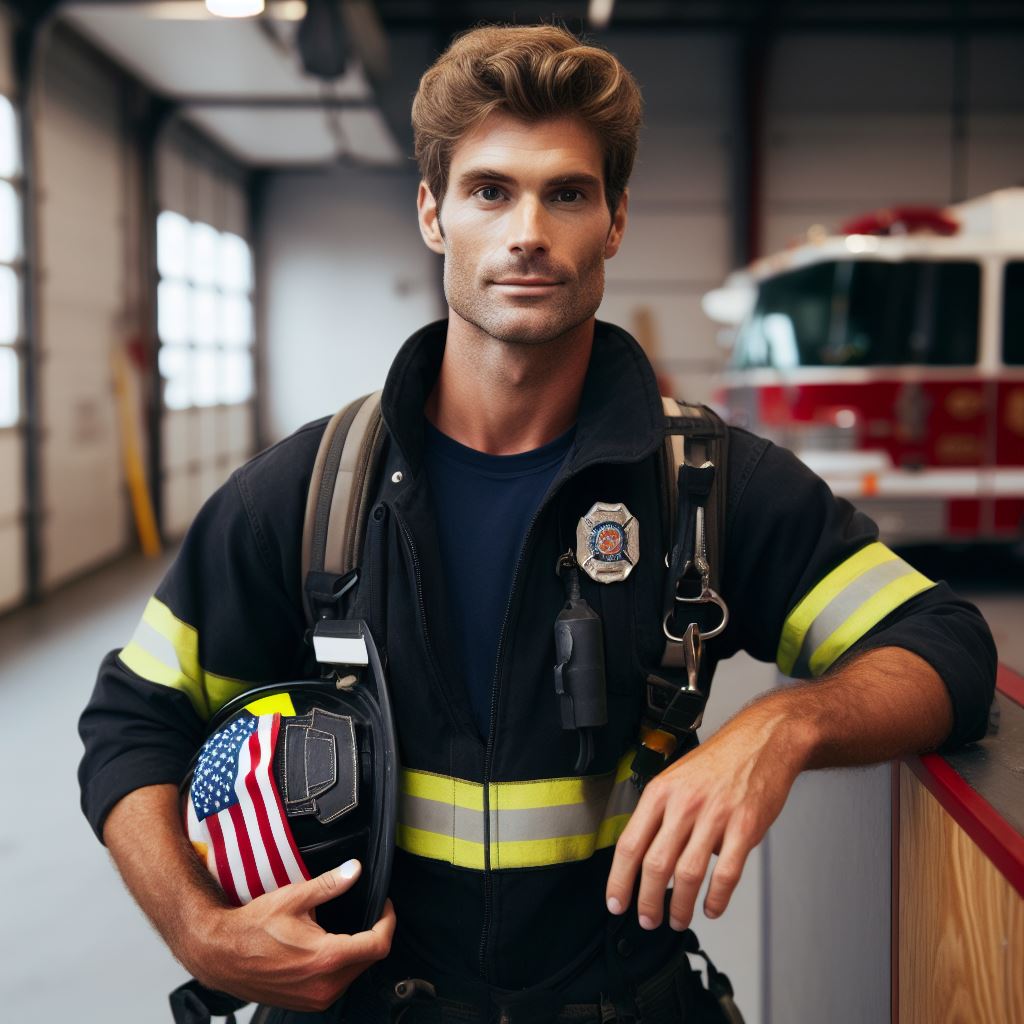Volunteer Firefighters: The Unsung Heroes in the U.S.
Last Updated on January 27, 2024
Introduction
Volunteer firefighters play a crucial role in the United States, dedicating their time and effort to saving lives and protecting communities.
Without expecting any financial compensation, these selfless individuals provide invaluable service in times of emergencies.
Definition of volunteer firefighters
Volunteer firefighters are individuals who willingly offer their services to fire departments without any payment.
They undergo extensive training to respond effectively to fires, accidents, and other emergencies. They are an integral part of the emergency response system.
Importance of volunteer firefighters in the U.S.
Volunteer firefighters are vital to the U.S. as they provide essential services, especially in rural areas where professional firefighters may be scarce.
With their dedication, they ensure prompt response times, reducing the risks to life and property.
These unsung heroes demonstrate bravery and heroism, willingly facing dangerous situations to protect their communities. Their presence enhances the overall firefighting capabilities throughout the country.
Volunteer firefighters also contribute to community engagement and cohesion. They establish strong bonds within their neighborhoods, fostering a sense of belonging and unity.
Their positive influence extends beyond emergency response, creating a safer and more tightly knit society.
Moreover, volunteer firefighters help save taxpayers’ money. As they offer their services without payment, communities can allocate more resources towards necessary equipment and infrastructure.
This cost-effectiveness ensures efficient fire departments that can address emergencies promptly.
In general, volunteer firefighters are the backbone of fire departments in the U.S. Their selfless dedication, expertise, and community involvement make them indispensable.
These unsung heroes deserve recognition and support for their invaluable contributions to public safety.
History of Volunteer Firefighters
- In the early days, communities relied on the efforts of able-bodied citizens to combat fires.
- The origins of volunteer firefighting in the U.S. can be traced back to the colonial era.
- Benjamin Franklin established the first volunteer fire company in 1736 in Philadelphia.
- As American cities grew, the need for organized firefighting became evident.
- In the 19th century, volunteer firefighting organizations became prominent across the country.
- These organizations were initially operated by citizen volunteers and funded by community donations.
- Volunteer firefighters played a crucial role in protecting lives and property in their communities.
- The dedication and bravery of these unsung heroes saved countless lives throughout history.
Origins of Volunteer Firefighting in the U.S.
- Volunteer firefighting in the U.S. was inspired by the European tradition of communal firefighting.
- The first American volunteer fire companies were established in major cities such as Boston and New York.
- These companies consisted of able-bodied citizens who formed organized fire brigades.
- They would respond to fire alarms and use hand-operated pumps to extinguish fires.
- One of the earliest recorded fire companies in the U.S. was the Union Fire Company of Philadelphia.
- The need for volunteers arose due to limited resources and a lack of professional firefighting services.
- Volunteers became the backbone of fire protection and prevention in their communities.
Development and Growth of Volunteer Firefighting Organizations
- As the country expanded, volunteer firefighting organizations grew in number and importance.
- The 19th century witnessed the establishment of volunteer fire companies in rural areas as well.
- These organizations were essential in combating fires in towns and remote areas where other resources were scarce.
- Volunteer firefighters were trained in fire suppression techniques and worked in close collaboration.
- The development of new firefighting technologies further enhanced the effectiveness of volunteer fire companies.
- The introduction of steam-powered fire engines enabled firefighters to extinguish fires more efficiently.
- Volunteer fire departments gradually evolved, providing a range of services beyond firefighting.
- Today, volunteer firefighters continue to serve their communities, responding to emergencies and promoting fire safety education.
The history of volunteer firefighters in the U.S. is a testament to the selflessness and dedication of ordinary citizens.
These brave individuals, driven by a sense of duty, have played a vital role in protecting lives and property.
From humble beginnings in colonial times to the present day, volunteer firefighting organizations have grown and adapted.
Their commitment to public safety continues to make a profound impact on communities across the nation.
It is important to recognize and appreciate the sacrifices made by these unsung heroes who serve as a lifeline during emergencies.
Duties and Responsibilities of Volunteer Firefighters
Volunteer firefighters play a crucial role in protecting and serving their communities. These unsung heroes dedicate their time, skills, and passion to ensure the safety and well-being of others.
Let’s take a closer look at the duties and responsibilities they undertake, from fire response and suppression to emergency medical services, hazardous materials incidents, and community education and prevention programs.
1. Fire Response and Suppression:
- Respond promptly to fire emergencies, whether it’s a structural fire, vehicle fire, or wildland fire.
- Utilize firefighting tools and equipment to conduct fire suppression and extinguishment operations.
- Rescue individuals trapped or endangered by the fire and provide immediate medical assistance if needed.
- Collaborate with other fire departments and emergency services to ensure efficient and coordinated response efforts.
2. Emergency Medical Services
- Receive training in basic life support (BLS) and become certified emergency medical technicians (EMTs).
- Respond to medical emergencies, including heart attacks, car accidents, and other life-threatening situations.
- Assess the patient’s condition, administer appropriate medical interventions, and stabilize them for transport.
- Communicate vital information to paramedics and other healthcare professionals upon their arrival.
3. Hazardous Materials Incidents
- Identify, assess, and mitigate hazardous materials incidents such as chemical spills or leaks.
- Utilize specialized personal protective equipment (PPE) and follow established protocols to ensure safety.
- Implement containment and control measures to prevent further spread of hazardous substances.
- Cooperate with hazardous materials response teams and other agencies to safeguard the community.
4. Community Education and Prevention Programs:
- Conduct fire safety presentations and demonstrations to educate the public, especially children, about fire prevention.
- Organize and participate in community events, such as open houses and safety fairs, to promote awareness.
- Install and inspect smoke detectors, carbon monoxide detectors, and fire extinguishers in residential areas.
- Collaborate with schools, businesses, and organizations to develop emergency response plans and drills.
In addition to these primary responsibilities, volunteer firefighters also engage in regular training sessions and take part in ongoing professional development.
This ensures they are equipped with the necessary skills and knowledge to face any emergency situation effectively.
It’s important to recognize and appreciate the selflessness of volunteer firefighters, as they often balance their commitment to public safety with full-time jobs and personal responsibilities.
Their dedication to serving their communities, often without monetary compensation, exemplifies the true spirit of heroism.
Through their efforts, volunteer firefighters enhance the overall safety and preparedness of their communities.
Their swift response and effective actions save lives, protect property, and instill a sense of peace and security among residents.
They are the backbone of the firefighting force in many rural areas and provide critical support to professional firefighters in urban settings.
In short, volunteer firefighters go above and beyond their call of duty, demonstrating bravery, compassion, and resilience under challenging circumstances.
Their duties encompass fire response and suppression, emergency medical services, handling hazardous materials incidents, as well as community education and prevention programs.
It is our responsibility to support and recognize these unsung heroes who work tirelessly to keep us safe.
Read: Women in the U.S. Military: Breaking Barriers & Traditions
Challenges Faced by Volunteer Firefighters
Volunteer firefighters in the U.S. are often unrecognized, yet they face numerous challenges in their service.
Limited Funding and Resources
Many volunteer fire departments struggle with inadequate funding and a shortage of resources.
- They rely heavily on community donations and fundraisers to purchase essential equipment and maintain operations.
- Without proper funding, volunteer firefighters may have outdated equipment, limited training opportunities, and insufficient staffing.
- These challenges make it difficult for them to effectively serve and protect their communities.
Balancing Volunteer Firefighting with Other Professions
Most volunteer firefighters have other full-time or part-time jobs and must find a balance.
- They often face challenges managing their time and coordinating emergency response services with their work schedules.
- Volunteer firefighters must be ready to respond to emergencies at any time, which can be demanding alongside their regular employment.
- Juggling these commitments can lead to fatigue and stress, affecting their effectiveness on the job.
Emotional and Physical Toll of the Job
Volunteer firefighting is emotionally and physically demanding, causing both short-term and long-term effects.
- They witness traumatic events and experience emotional distress, including dealing with loss and devastation.
- The physical toll is high, as they frequently endure strenuous tasks, exposure to hazardous materials, and risk of injury.
- These experiences can result in post-traumatic stress disorder (PTSD), anxiety, and depression.
- Additionally, volunteer firefighters may face burnout due to the constant demands of the job.
Volunteer firefighters play a crucial role in protecting their communities, but their efforts often go unnoticed.
Despite limited funding and resources, they continue to serve selflessly, risking their lives for others.
The challenges they face, including balancing multiple professions and coping with the emotional and physical toll, are immense.
Recognizing the dedication and sacrifices of these unsung heroes is essential to ensure their well-being and continued service.
Read: Military Technology: Tools of the Modern American Soldier
Benefits of Volunteer Firefighting
Volunteer firefighters play a crucial role in ensuring the safety and well-being of communities.
While their services often go unnoticed, they are the unsung heroes who selflessly dedicate their time and effort to protect others.
Engaging in volunteer firefighting offers numerous benefits, ranging from a sense of purpose and community service to the acquisition of valuable skills and opportunities for personal and professional growth.
Sense of Purpose and Community Service
- Volunteer firefighters find immense fulfillment in serving their communities.
- They have a clear purpose in safeguarding lives and property during emergencies.
- Contributing to the betterment of society creates a strong sense of satisfaction.
- Knowing that they make a difference in people’s lives fuels their commitment.
Acquisition of Valuable Skills and Experience
- Volunteer firefighters undergo extensive training to handle various emergencies.
- They learn essential skills such as fire suppression, first aid, and rescue techniques.
- Handling complex equipment and understanding the principles of fire behavior enhances their expertise.
- Experiencing real-life situations prepares them for challenging scenarios, increasing their efficacy.
Opportunities for Personal and Professional Growth
- Volunteer firefighting provides a platform for personal growth and self-improvement.
- It fosters leadership, teamwork, and effective communication skills.
- Working alongside experienced professionals allows for mentorship and knowledge sharing.
- Volunteers often develop strong bonds and relationships, building a reliable support network.
- Engaging in community events and outreach programs further enhances their interpersonal skills.
- Volunteer firefighters gain an edge in their professional careers through the diverse experiences they acquire.
- Employers highly value the dedication, resilience, and problem-solving skills developed in firefighting.
- These experiences can open doors to careers in emergency services and related fields.
Benefits to the Community
Not only do volunteer firefighters reap personal rewards, but communities also greatly benefit from their service.
- Volunteers save municipalities substantial sums of money by providing firefighting services for free.
- They provide vital support to local fire departments, aiding their response capabilities.
- In remote areas with limited resources, volunteer firefighters often serve as the primary emergency responders.
- Volunteers contribute to community resilience and readiness in the face of disasters.
- They educate the public about fire safety, reducing the occurrence of preventable emergencies.
In review, volunteer firefighters are the unsung heroes who remarkably contribute to the well-being of communities.
Engaging in volunteer firefighting offers a sense of purpose and fulfillment, the acquisition of valuable skills, and opportunities for personal and professional growth.
By volunteering, individuals not only enhance their own lives but also play a crucial role in fostering community safety and resilience.
Discover More: Key Skills and Training for Aspiring US Detectives
Volunteer Firefighters: The Unsung Heroes in the U.S.
Stories and Testimonials of Volunteer Firefighters
Volunteer firefighters selflessly dedicate their time and effort to serve their communities.
Their stories are filled with bravery, sacrifice, and a deep commitment to public safety.
- Joanna, a volunteer firefighter in a small town, rescued a child from a burning building.
- David’s heroic act of saving a family’s pets from a raging wildfire is an inspiration to all.
- Mark risked his life to rescue an elderly couple trapped in a vehicle after a car accident.
- Emily’s quick thinking and medical training saved a man’s life during a heart attack incident.
- Many volunteer firefighters have stories of going above and beyond their call of duty.
These testimonials highlight the courage and selflessness inherent in volunteer firefighters.
Personal Accounts of Heroic Acts and Bravery
Volunteer firefighters confront danger head-on, displaying extraordinary acts of bravery.
- Mike, a volunteer firefighter for 10 years, faced intense heat to rescue a trapped construction worker.
- Sarah demonstrated exceptional courage during a water rescue, diving into freezing waters to save a life.
- Jake fearlessly battled a wildfire, ensuring the safety of nearby homes and protecting the community.
- Emma, a single mother and volunteer firefighter, successfully administered CPR to save a choking toddler.
- These personal accounts unveil the bravery, resilience, and strength possessed by volunteer firefighters.
Impact on the Lives of Individuals and Communities
Volunteer firefighters have a profound impact on the individuals they help and the communities they serve.
- James, a fire victim, owes his life and home to the rapid response of volunteer firefighters.
- The presence of volunteer firefighters in rural areas provides a critical lifeline during emergencies.
- Communities feel a sense of security knowing volunteer firefighters are always ready to assist.
- Local businesses thrive due to the protection offered by diligent volunteer firefighters.
- The impact of volunteer firefighters cannot be measured solely in statistics but in lives saved and futures protected.
By leveraging their skills, knowledge, and dedication, volunteer firefighters make a significant difference.
In closing, volunteer firefighters are the unsung heroes who willingly put themselves in harm’s way to protect their neighbors and community.
Their stories and testimonials bear witness to their exceptional acts of courage and bravery. Through their selflessness, they positively impact the lives of individuals and the larger communities they serve.
These extraordinary individuals deserve our admiration and appreciation for their unwavering commitment to public safety.
Read: Financial Planning for U.S. Military Personnel & Families

You Might Also Like: Firefighter Brotherhood: Bonds Forged in Flames
Learn More: Challenges of Urban vs. Rural Firefighting in the U.S.
Ways to Support Volunteer Firefighters
Volunteer firefighters are the unsung heroes of the United States, risking their lives to save others and protect communities.
These brave individuals deserve our support, and there are several ways we can contribute to their well-being and success.
Advocating for increased funding and resources
Advocating for increased funding and resources is crucial to ensure that volunteer firefighters can effectively carry out their responsibilities.
Contacting local government officials and expressing the need for adequate funding for equipment, training, and recruitment can make a significant difference.
By actively voicing our concerns, we can influence policymakers to prioritize the safety of our communities.
Volunteering or donating to local fire departments
Another impactful way to support volunteer firefighters is by volunteering or donating to local fire departments.
Volunteering allows us to directly contribute to their vital operations.
Whether it’s assisting with administrative tasks, helping with maintenance, or participating in training exercises, our involvement can lighten their workload and boost their capabilities.
Additionally, offering financial donations helps them acquire necessary equipment, provide training programs, and enhance their overall readiness.
Recognizing and appreciating their efforts
Recognizing and appreciating the efforts of volunteer firefighters is crucial. These individuals sacrifice their time, often without any financial compensation, to serve and protect.
By showing gratitude, we can motivate and uplift their spirits.
Simple gestures like writing thank-you notes, organizing community events, or publicly acknowledging courageous acts boost morale and inspire support for others.
In a nutshell, supporting volunteer firefighters is vital to ensure the safety of our communities.
Advocating for increased funding and resources, volunteering or donating to local fire departments, and recognizing their efforts are effective ways to make a difference.
Each step we take contributes to their success and encourages more individuals to join their ranks. Let us show our gratitude and support for these heroes who tirelessly work to keep us safe.
Read: The Role of the U.S. Coast Guard: Beyond Sea Rescues
Uncover the Details: Understanding Different Security Guard Roles and Specializations
Conclusion
In the end, volunteer firefighters play a crucial role in communities across the United States. They are the unsung heroes who selflessly dedicate their time and effort to protect lives and property.
Throughout this blog section, we have explored the importance of volunteer firefighters and the vital role they play in emergencies.
We have learned that they often serve as the first line of defense in fire incidents, providing immediate response and assistance.
Volunteer firefighters deserve utmost acknowledgment for their unwavering dedication.
They sacrifice their personal time, putting themselves in harm’s way to ensure the safety of others. The bravery and selflessness they display should be celebrated.
Without a doubt, it is their commitment and passion that keep our communities safe.
Whether it’s battling wildfires, rescuing people from burning buildings, or providing medical assistance, volunteer firefighters are always there, ready to respond to any emergency.
Their role as unsung heroes cannot be overstated. Recognizing and appreciating their efforts is essential. We must support them by providing adequate resources, training, and incentives to attract and retain volunteers.
To summarize, volunteer firefighters are the backbone of many communities in the U.S. Their vital role should never be underestimated.
By acknowledging their dedication and selflessness, we can ensure that they continue to serve and protect our society for years to come.


